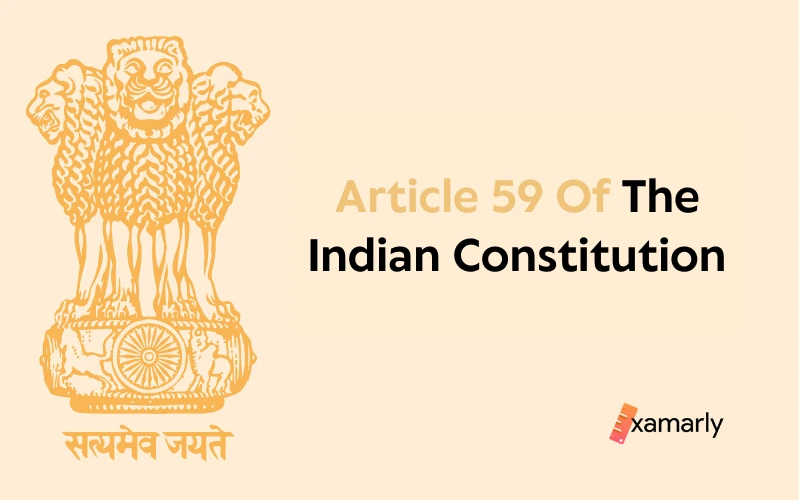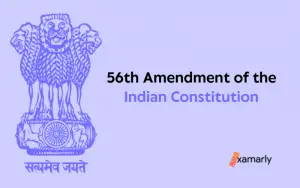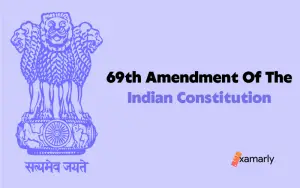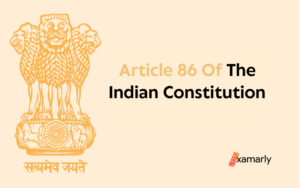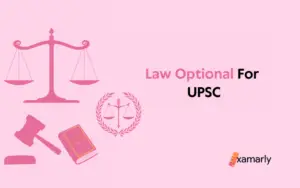Chapter 1 (The Executive) of Part V contains Article 59 of the Indian Constitution. It is one of the major Indian articles. Although the President is the official head of the executive, he or she is not able to be detained or locked up. He follows the Ministerial Council’s recommendations while making decisions.
This article describes the major provisions of Article 59 of the Indian constitution.
- What is Article 59 of the Indian Constitution?
- Conditions of the President's Office
- Official Residence, Emoluments, and Allowances of the President
- Conclusion
- FAQs
- Can the emoluments and allowances of the President diminish?
- What is Article 59 (3)?
- Article 59 deals with what?
- Under which Part of Article 59 is covered?
- Which are the official residences of the President?
- Who decides the salary of the President of India?
- How to remember Article 59 of the Indian Constitution?
What is Article 59 of the Indian Constitution?
The prerequisites for holding the position of the president are outlined in Article 59 of the Indian Constitution as the power of parliament. The prerequisites for his or her election as the nation’s president are among the qualifications.
An individual cannot occupy a position of profit or be a member of either the Lok Sabha or the Rajya Sabha, according to the requirements of the presidency.
Also read: Powers And Functions Of Lok Sabha and Rajya Sabha
Conditions of the President’s Office
The conditions of the president’s office are covered in this article. It is about the special provisions of Article 59 of the Indian Constitution.
These are the conditions:
- The President may not be a member of either the House of Representatives or the House of the Legislature of any State. If a member of either the House of Representatives or the House of the Legislature of any State is elected President, he or she is deemed to have resigned from that seat on the date that he or she assumes the office of President.
- The President is prohibited from holding any other paid positions or office of profit.
- The President is entitled to the use of his official homes without having to pay rent. He also has the right to the emoluments, allowances, and privileges that Parliament may regulate by law, or, in the absence of such a provision, those that are listed in the Second Schedule.
- The President’s remuneration and benefits cannot be reduced while he is in office.
Official Residence, Emoluments, and Allowances of the President
The conditions for the emoluments and allowance services given to the president of India are covered in Article 59. The president’s monthly fixed salary and financial stipends are set at a specific amount. Other financial rights granted to the president include numerous others.
There are, however, a number of other requirements that are listed in article 59 of the Indian Constitution.
- The president is not permitted to serve in either house. Neither in the House of Representatives nor the Houses of Parliament of any state. Even if he or she is a member of one of the houses, they will have to give up their seat in that body on the day they take office as the nation’s president.
- The President is not permitted to take any paid positions in any public office, either at the federal or state level.
- The president’s salary and benefits won’t be cut under any circumstances while they’re in office.
- The President is allowed to use the official residences without paying rent. And the parliament establishes these emoluments and allowances through law. Until then, the allowance, payments, and privileges are granted in accordance with the rules outlined in the second section of the article.
For Further Readings:
Conclusion
The integrity and unity of the country are held by the president of India, who is endowed with a variety of duties and authority. As a result, the president possesses a number of executive and governing functions that shape national government. The president, thus, is supplied with certain perks along with the assigned pay.
The president is provided with different emoluments and perks. These will not be decreased under any circumstances throughout his official tenure. The upkeep of the official residents and household establishments is handled. It is done by the president through a variety of facilities and allowances.
The salaries of the staff members employed at the president’s official homes were also covered by the allowances.
FAQs
Can the emoluments and allowances of the President diminish?
The salary and allowances of the President cannot be diminished during his term of office.
What is Article 59 (3)?
The President is entitled to the use of his official homes without having to pay rent. He or she is also entitled to the emoluments, allowances, and privileges that Parliament may decide by law, or, in the absence of such a provision, those that are listed in the Second Schedule.
Article 59 deals with what?
The conditions for the emoluments and allowances given to the president of India are covered in Article 59. The president’s monthly fixed salary and financial stipends are set at a specific amount. Other financial rights granted to the president include numerous others.
Under which Part of Article 59 is covered?
Article 59 is contained in chapter 1 of Part V of the constitution of India.
Which are the official residences of the President?
At the western end of the Rajpath on Raisina Hill in New Delhi, India, the Rashtrapati Bhavan serves as the president of India’s official residence.
Who decides the salary of the President of India?
The Union Parliament of India decides the salary of the Indian President.
How to remember Article 59 of the Indian Constitution?
Here’s a mnemonic to help you remember Article 59 of the Indian Constitution:
“SPRUCE – Salary, Parliament, Rent, Unpaid, Cut, Employment”
SPRUCE stands for the key points of Article 59:
Salary: The article covers the salary and allowances of the President of India.
Parliament: The President cannot be a member of either house of Parliament or the legislature of any state.
Rent: The President is allowed to use official residences without paying rent.
Unpaid: The President cannot hold any paid position in any public office.
Cut: The President’s salary and benefits cannot be reduced while in office.
Employment: The President’s emoluments and allowances are established by Parliament through law.


